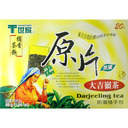Tea: Darjeeling Tea
A Darjeeling Black Tea from Tradition
| Brand: | Tradition |
| Style: | Darjeeling Black Tea |
| Region: | Darjeeling, India |
| Caffeine: | Caffeinated |
| Loose? | Sachet |
| # Ratings: | 1 View All |
Reviewer: Difflugia

✓ 170 teas reviewed
✓ 7 of Darjeeling Black Tea
✓ 57 of Black Tea
✓ 4 of Tradition
✓ 7 from Darjeeling, India
✓ 14 from India
Review of Darjeeling Tea
March 12th, 2019
| Aroma | Flavor | Value | Total |
| 9 of 10 | 4 of 5 | 5 of 5 | 88 of 100 |
| Superb | Good | Outstanding |
The oversized bags contain nearly 3g of medium-sized (for loose leaf tea) broken leaf pieces. It's definitely not a typical Darjeeling, though. Most Darjeelings are less oxidized than other black teas and tend to have more vegetal or floral aroma notes. This one's different. There's no green apparent on the leaves and it smells smoky and sweet.
The liquor brews up a dark red-amber. The aroma is smoky toffee, like a Keemun. Slightly burnt date cookies, maple syrup, brown sugar. The only sensation that's slightly offputting is that I keep catching a faint whiff of cigarette smoke, like there's an ashtray somewhere in the room or a jacket after a night out. If the package didn't have the Darjeeling appellation mark, I'd think that this was Chinese tea in a "Darjeeling style" or something.
The flavor is rich and heavy on the tongue. Underneath, I can recognize some of the light oakiness that I get from other Darjeelings, but it's mostly dark baked goods like molasses cookies and caramel. There's a mild bitterness in the flavor that hints at cocoa at the back of the throat, but this tea is otherwise rich sweetness. The finish and aftertaste are plausibly Darjeeling, with the dark flavors fading to lightly astringent grape skins and apple peel. While vastly different than what I expected, this tea's delicious.
After the initial steep of four minutes, I got a second cup that was lighter, but still flavorful.
I paid $3.29 for a box of 20 sachets at an Asian grocery store.
Add your own review
Comments:
| Alex Zorach wrote: on June 3rd, 2020 |
There are fully-oxidized Darjeelings that are quite dark, such as monsoon or rains teas. These are usually used in blending and not usually sold as single-flush or single-harvest teas, sometimes not even sold as Darjeeling tea.
However, there is also the possibility that this tea was not actually grown in Darjeeling. The lack of the mark would make me slightly suspicious. Darjeeling is something that I would consider outside the range of expertise of Tradition, a Taiwanese company.
There is no reason a tea produced in Darjeeling couldn't have the aromatic qualities you describe, but, having sampled a ton of Darjeeling teas, it's really uncommon, at least among teas that tend to reach the market here in the US. And I'm someone who actively seeks out atypical teas.
I also have noticed teas that have that "cigarette smoke" or "tobacco" like quality. In my experience though it's usually more common among green teas, like low-quality gunpowder teas, as well as some Ceylon green teas or Yunnan green teas, including teas of decent quality where those smoky or tobacco notes are not altogether unpleasant. But in the low-quality teas they can be harsh and unpleasant.
So...who knows what this is? I'm glad it was at least somewhat enjoyable! Stuff like this always sparks my curiousity, and sometimes, my suspicion as well!


